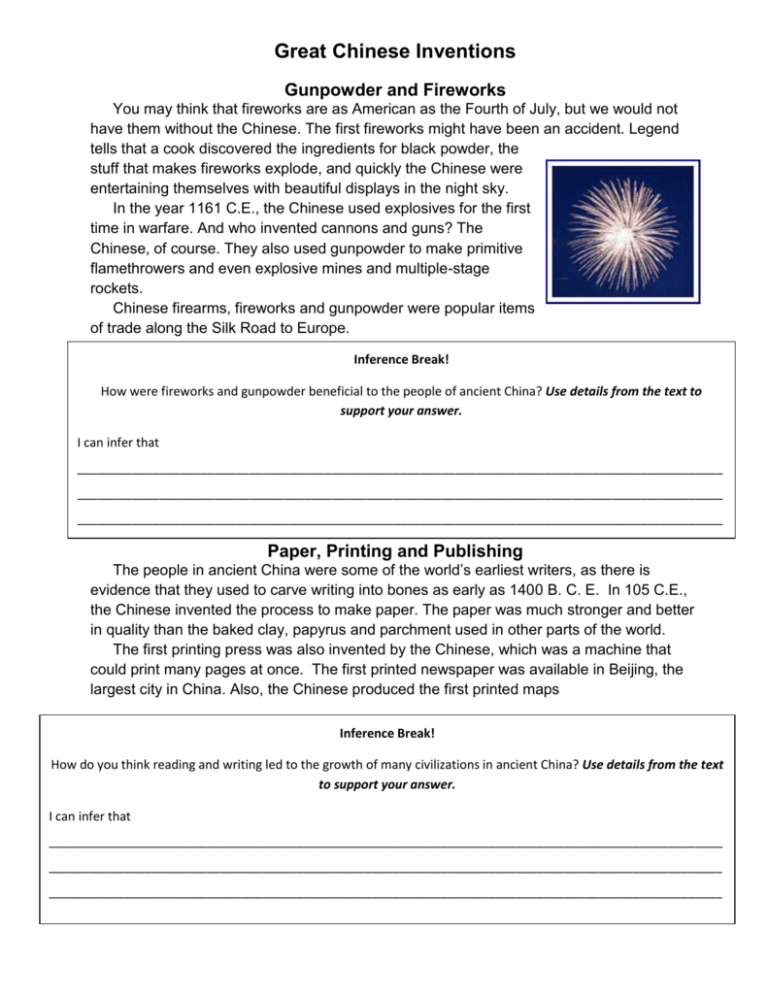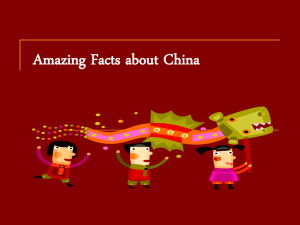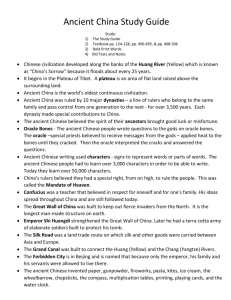Great Chinese Inventions Gunpowder and Fireworks
advertisement

Great Chinese Inventions Gunpowder and Fireworks You may think that fireworks are as American as the Fourth of July, but we would not have them without the Chinese. The first fireworks might have been an accident. Legend tells that a cook discovered the ingredients for black powder, the stuff that makes fireworks explode, and quickly the Chinese were entertaining themselves with beautiful displays in the night sky. In the year 1161 C.E., the Chinese used explosives for the first time in warfare. And who invented cannons and guns? The Chinese, of course. They also used gunpowder to make primitive flamethrowers and even explosive mines and multiple-stage rockets. Chinese firearms, fireworks and gunpowder were popular items of trade along the Silk Road to Europe. Inference Break! How were fireworks and gunpowder beneficial to the people of ancient China? Use details from the text to support your answer. I can infer that ______________________________________________________________________________________________ ______________________________________________________________________________________________ ______________________________________________________________________________________________ ______________________________________________________________________________________________ Paper, Printing and Publishing ______________________________________________________________________________________________ The people in ancient China were some of the world’s earliest writers, as there is evidence that they used to carve writing into bones as early as 1400 B. C. E. In 105 C.E., ______________________________________________________________________________________________ the Chinese invented the process to make paper. The paper was much stronger and better in quality than the baked clay, papyrus and parchment used in other parts of the world. The first printing press was also invented by the Chinese, which was a machine that could print many pages at once. The first printed newspaper was available in Beijing, the largest city in China. Also, the Chinese produced the first printed maps _____________________ Inference Break! How do you think reading and writing led to the growth of many civilizations in ancient China? Use details from the text to support your answer. I can infer that __________________________________________________________________________________________________ __________________________________________________________________________________________________ __________________________________________________________________________________________________ __________________________________________________________________________________________________ __________________________________________________________________________________________________ _____________________________________________________________________________________________ Farming Inventions Around 300 B.C. E., China produced a special plow for preparing farmland for crops. This plow was important because it turned the soil up more easily and efficiently, which made it better for planting seeds in. Eventually, these plows became so successful that they would become very important in other parts of the world. Chinese farmers also greatly improved the ability of horses to pull wagons or plows with the "collar harness." A harness is something a horse or cow wears to pull a cart or a piece of equipment. Unlike the "throat harnesses" used in Europe, the collar harness did not choke the animal. When horses breathed easier, they could pull more weight greater distances. The wheelbarrow is another tool that saved farmers a lot of time and effort and was invented by the Chinese in approximately 100 B.C.E. This important tool was not seen in Europe until almost 200 years later. Inference Break! How were the farming inventions an advantage to the people of ancient China? What do you think changed as a result of these farming inventions? Use details from the text to support your answer. I can infer that _____________________________________________________________________________________________ ______________________________________________________________________________________________ ______________________________________________________________________________________________ ______________________________________________________________________________________________ ______________________________________________________________________________________________ Scientific Inventions and Discoveries ______________________________________________________________________________________________ When Chinese invented the magnetic compass, it was originally a religious device. People believed their homes should face north to be in harmony with nature. So, they used the compass before they built. Later, the compass was used so that people could figure out where they needed to go, both on land and when they were sailing in the ocean. This became a very important tool for explorers to use all around the world. Hoping to help predict oncoming earthquakes, the Chinese invented the world’s first seismograph, a tool that measures how strong earthquakes are, in approximately 200 C.E. By 1080 C.E., Chinese scientists were exploring ideas that the Earth’s temperature had changed over time, based on their studies of plant fossils. Twenty years later, they explained the causes of solar and lunar eclipses. As early as the 200 B.C.E., there is evidence that Chinese scientists were able to explain how blood circulated in the body The Chinese invented the first decimal system for mathematics in 400 B.C.E. Cast iron, a very important and strong type of metal, was first invented in China in 400 B.C.E. The abacus was a great invention in ancient China and has been called the world’s first calculator. ____________ What can you infer about the value of education in ancient China, based on all the important scientific inventions and discoveries that they made? How do you know that your inference is true? Use details from the text to support your answer. I can infer that __________________________________________________________________________________ __________________________________________________________________________________ __________________________________________________________________________________ __________________________________________________________________________________ __________________________________________________________________________________ Information People in ancient China made many important changes to farming. For example, they used terracing. Terracing meant that they turned the slopes of hills into flat steps. They were able to grow their crops on the flat steps. Archeologists believe that people in ancient China were the first people to try to do surgery. People in ancient China also created many important medicines from plants and were the first people to keep track of patient records. The Chinese are also known for creating paper. While they originally wrote on bamboo, paper was invented in China by combining tree bark, string, rags, and fishnets together to create a wet mixture. This was put on a piece of bamboo and then dried. People in ancient China were able to figure out how to make many swords at one time and they invented the crossbow, which is a powerful type of bow and arrow made out of wood. The ancient Chinese were very good at math and it showed in many of their inventions. For example, they were able to study the stars to figure out the calendar system that we still use today. They also created a clock that was timed by water and they were able to create a tool called a seismograph that measured how strong earthquakes were. What can you infer about ancient China? What evidence do you have from the text to support your inference?






